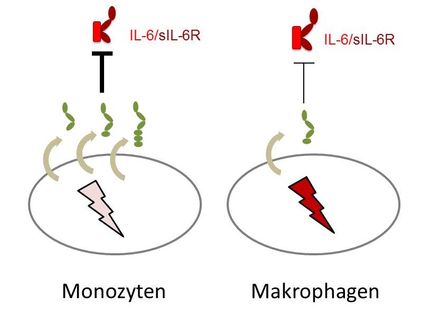ACZ885, a new biological drug in development, shows potential in treating serious life-long autoinflammatory diseases
Human monoclonal antibody ACZ885 blocks interleukin 1ß, a key chemical messenger that causes inflammation and tissue destruction
New data demonstrate that ACZ885, a human monoclonal antibody in Phase III development, achieves long-lasting clinical remission in patients with genetic autoinflammatory diseases. The results indicate that ACZ885 could develop into a major therapeutic advance in the treatment of Cryopyrin-Associated Periodic Syndromes (CAPS), a group of rare but serious life-long diseases including Muckle Wells Syndrome.
In the Phase II study, CAPS patients treated with ACZ885 showed an improvement in symptoms within one day and all achieved complete clinical remission within seven days. Clinical remission lasted 115 days on average. The results were presented today at the Fifth International Congress on Familial Mediterranean Fevers and Systemic Autoinflammatory Diseases in Rome.
"The latest findings are a promising step forward for patients with rare autoinflammatory diseases," said Trevor Mundel, MD, Head of Global Development Functions at Novartis Pharma AG. "We are optimistic that ACZ885 could become an innovative treatment option for patients affected by inflammatory diseases involving IL-1ß. ACZ885 reflects our commitment to developing innovative treatments that address unmet medical needs, in patients with serious but rare conditions."
ACZ885 is also being investigated in more common inflammatory diseases such as rheumatoid arthritis (RA), which affects up to 1% of the world's population[4]. A study in RA currently under way uses an innovative tailored approach with biomarkers to predict response to treatment. If successful, this will give suitable patients a personalized approach to treating their disease.
Unlike other agents, ACZ885 blocks solely interleukin 1ß (IL-1ß), one form of interleukin-1 protein that causes the body to 'attack' itself in autoinflammatory diseases such as CAPS. Patients affected by CAPS have symptoms such as fever, fatigue, skin rash, painful joints and muscles, and severe headache. They can also suffer from more severe complications like hearing loss and amyloidosis, a group of diseases in which some organs accumulate high deposits of proteins causing kidney failure and leading to dialysis or transplantation.
The study results presented in Rome involved 20 patients with CAPS aged between six and 50 years, who received an injection of ACZ885 every two months dosed at 150 mg for adults or two mg per kilo body-weight for children. ACZ885 was well-tolerated in the study, with only mild skin reactions at the injection site. The most common adverse events were upper respiratory tract infections.
Other news from the department research and development

Get the life science industry in your inbox
By submitting this form you agree that LUMITOS AG will send you the newsletter(s) selected above by email. Your data will not be passed on to third parties. Your data will be stored and processed in accordance with our data protection regulations. LUMITOS may contact you by email for the purpose of advertising or market and opinion surveys. You can revoke your consent at any time without giving reasons to LUMITOS AG, Ernst-Augustin-Str. 2, 12489 Berlin, Germany or by e-mail at revoke@lumitos.com with effect for the future. In addition, each email contains a link to unsubscribe from the corresponding newsletter.






















































